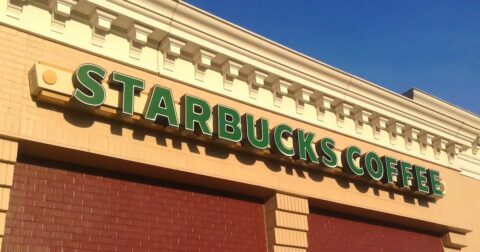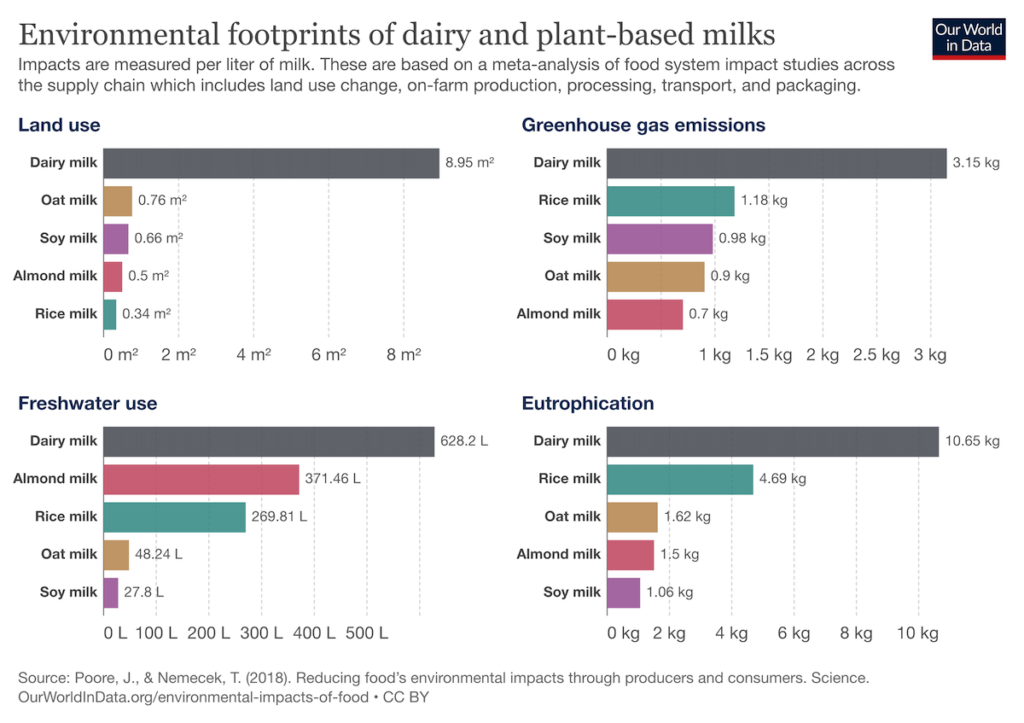Investigation
Industry Groups Worked to Expand Wisconsin Bill Meant for Small Dairies
Factory Farms•7 min read
Perspective
Starbucks could easily drop its plant milk surcharge. If it believes its own climate rhetoric, it can’t afford not to.


Words by Marina Bolotnikova
Twenty twenty-two wouldn’t be 2022 without vegans supergluing themselves to stuff. Succession actor James Cromwell did it in May at a Manhattan Starbucks in protest of the coffee chain’s extra charge for plant-based milk — “When will you stop raking in huge profits while customers, animals and the environment suffer?” the 82-year-old thundered over a chattering crowd of Starbucks guests. “There’s no reason for it except greed.”
The stunt accomplished its goal. The internet was beside itself. It got people talking about whether it’s reasonable for the world’s biggest coffee chain to charge 70 cents more to swap soy, oat, almond or coconut milk for dairy. (In busy markets like New York City, the charge is reportedly 80 cents.) I was struck by how many people logged on to Twitter just to shout, Of course they’re going to charge more for plant milk, you idiot, its MARKET PRICE is higher! Only in America are people this obsessed with defending multi-billion dollar corporations. This take has it backwards — Starbucks could easily drop the surcharge. In fact, if it believes its own climate rhetoric, it can’t afford not to.
Some spectators responded smugly to Cromwell’s protest with some version of, Ever thought of the vast amount of water needed to grow almonds?, as though breeding millions of 1500-pound cattle to bottle and sell their breast milk doesn’t take an enormous toll on the planet. Although almond milk isn’t the most planet-friendly plant milk (soy and oat are), the environmental footprint of dairy dwarfs it and every other plant milk — to say nothing of the horrors it inflicts on cows and calves.

I hadn’t thought much about Starbucks’s vegan tax before, but something about Cromwell’s protest engrossed me. The ferocity of people who couldn’t fathom a legume milk sharing an even playing field with dairy, which already enjoys so much undeserved government support, provoked an equal and opposite reaction in me. Wait a minute, I thought. Why are vegans being punished for making the right choice? Not only should Starbucks drop the plant-based tax, but they should default to plant milks and charge more for dairy!
Starbucks has to respond to market imperatives, of course, but it’s also a mega-corporation that can internalize whatever costs it chooses — and it does. Up until the pandemic, for example, it made free unlimited quantities of cream available in self-serve carafes. Now customers can request free splashes of any type of cream or milk from behind the counter. Starbucks still has to pay for that milk, but rather than saddling only those customers who ask for it with the cost, it’s spread across everyone. They’ve accepted it as a cost of doing business.
“It takes away their argument of, ‘We have to pay for it, so we have to pass it on to the customer,’” said Dotsie Bausch, founder of the dairy-free advocacy group Switch4Good, which has been pressuring Starbucks to drop the plant milk surcharge.
Starbucks has already eliminated the charge in the UK. If they really wanted to be a leader in corporate social responsibility, they could go even further and follow the example of companies like Blue Bottle Coffee, which has made oat milk the default at all its U.S. locations, so that milk-based drinks like lattes are made plant-based unless requested otherwise.
How much money would Starbucks lose on each vegan drink if it made plant milks free? Certainly not the full 70 cents because, for one thing, the charge is uniform across all drink sizes. The company also makes its own soy, almond, and coconut milks, and buys its oat milk from Oatly. These very different commodities do not all cost the same, and it seems exceedingly unlikely any of them would cost 70 cents per serving. At Target, a half-gallon of Silk soy milk retails for $2.99, making the cost per cup 37 cents. Starbucks is secretive about how the sausage is made, so to speak, but Bausch told me that Switch4Good estimates their house-made plant milks cost them an additional six to 15 cents per drink. That the cost to customers is so much higher than this, Bausch believes, suggests the plant milk surcharge is little more than a money-making scheme. A Starbucks representative declined to comment on the accuracy of Bausch’s cost estimate, and did not return a request for comment on the suggestion that the plant milk upcharge is profit-driven.
Pivoting to plant milks is already part of Starbucks’s climate goals. The company aims to halve its greenhouse gas emissions by 2030, and according to its Global Environmental and Social Impact Report, expanding plant-based options is one way they plan to do it. “Alternative milks will be a big part of the solution,” former CEO Kevin Johnson told Bloomberg in 2020. How on earth do they expect to achieve a shift to plant milk while making customers go out of their way to ask for it and charging so much more for it? What use does Starbucks have for an extra dollar on an uninhabitable planet? Once a trailblazer in the coffee chain business, Starbucks now has the attitude of an entrenched behemoth set in its ways, afraid of taking worthy risks.
There are other reasons to end the plant milk tax too, like the fact that cows are arguably the sweetest creatures on earth and should not be brutalized for a product that no one needs.
Starbucks also purports to care about racial injustice, yet the plant-milk tax imposes a heavier burden on communities of color. Lactose intolerance is much, much more widespread among people of color in the U.S. than the white population, according to Andrea Freeman, a law professor at the University of Hawaii who studies race and food policy. Freeman believes defaulting to plant milk for reasons of racial equity is “a great idea,” but adds that as a purveyor of $4- and $5-plus lattes, Starbucks is inherently going to be exclusionary. Fair enough. On that note, Starbucks should also, obviously, let its workers unionize.
To my surprise, it’s extremely hard to find good statistics on the volume of cow’s milk and plant milk sold to U.S. coffee shops. Starbucks declined to disclose how much of each milk it uses, and the leading dairy industry trade groups didn’t know either (one would think they have an interest in tracking such things). Oatly also didn’t respond to questions about how much oat milk they sell to Starbucks.
So I decided to camp out at a Starbucks in downtown Madison, Wisconsin, to get a sense of what people were ordering. I opted for a small cappuccino and, after not being asked what kind of milk I wanted, quickly added, “with soy milk.” It came out to $4.49 — a lot to pay for 12 ounces of espresso and plant milk, though it would have been 10 cents less if I remembered to bring a reusable mug.
In this highly unscientific study, I counted 12 people out of 37 — just under a third — who opted for plant milks in milk-based drinks like lattes, macchiatos and hot chocolate (I was going to repeat this the next day at a suburban Starbucks, but I got Covid). Oat and soy were the most popular, followed by almond and coconut, which surprised me because I think of soy, my milk of choice, as being unfairly demonized and displaced by other plant milks. Many things likely skewed my findings in various directions: the extremely small sample, the time of day (mid-to-late morning), the fact that Madison is whiter than the U.S. as a whole, and that the city is very progressive, although this Starbucks is right next to the Wisconsin State Capitol, which employs many Republicans and dairy industry boosters. The first person of color I saw come in that morning was also the first person to ask for plant-based milk. Later, a white woman changed her order after realizing there was an additional charge for alternative milks.
Michele Simon, founder of the Plant Based Foods Association, suggested that Starbucks could simply ask what kind of milk customers want instead of assuming dairy. Or it could just default to plant milk to avoid creating extra labor for its workers. Customers who really want dairy would still have the option to ask for it, and the rest may not even care.
To get a very rough sense of the impact of defaulting to plant milks, I took the number of disposable cups Starbucks says it uses globally every year, which is about six billion according to Bloomberg, and the proportion of its sales that are in North America: about three-quarters. If we estimate that half of those are milk-based drinks, and something like 15 to 20 percent of customers, as Bloomberg reported, are choosing plant milks, a conservative estimate suggests it uses at least 113 million gallons of cow’s milk per year. (An 11-year-old Business Insider estimate put Starbucks’s annual milk consumption at 93 million gallons, which suggests both that my calculation is on the right track and that the true volume used today is much higher than 113 million gallons.) By my estimate, then, the swap could spare 49,000 dairy cows, or about .5 percent of the U.S. dairy herd, and their doomed offspring.
Because Starbucks leads the market, defaulting to plant milk would put pressure on other coffee chains, most (but not all!) of which charge extra for it, to do the same. The right thing to do should be made easy and automatic, and the time to act was yesterday. “Even if they still offered cow’s milk but upcharged for it, and educated people as to why,” Bausch said, “what an incredibly strong statement to the country and the world that they deeply care about the future of this planet.”